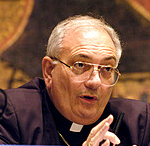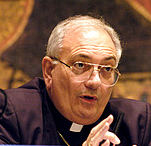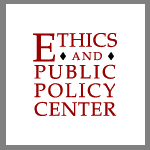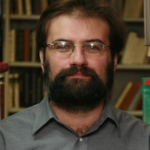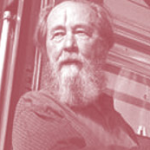
Sergey Khudiev
Source:
Pavmir
Translated from Russian by Fr. Andrew Phillips.
The article by Archpriest Robert Arida ‘Response To Myself is of interest, but not so much because it shows a certain approach, which is above all characteristic of contemporary liberal Protestantism. Convinced atheists, Muslims and Christians of various confessions have something in common – they all try to set out their views clearly and without ambiguity, so that any reader can clearly grasp what the writer believes and does not believe, what you agree with him about and what you do not agree with him about and what the arguments he puts forward are.
Liberal theologians are not like this. They have a particularity which entails a tendency to explain themselves with rhetorical questions, vague allusions and highly mysterious phrases from which you can with more or less justification guess at their positions, but are unable to explain clearly. This is very noticeable among liberal Protestants, very rare among Catholics and, until recently, simply did not exist among Orthodox. However, Orthodox do not live in a separate world and a certain influence of liberal Protestantism can creep into the Church.
We will not analyse the whole article, but let us concentrate instead on its concluding moment:
How is the Church going to minister to those same sex couples who being legally married come with their children and knock on the doors of our parishes seeking Christ. Do we ignore them? Do we, prima facie, turn them away? Do we, under the rubric of repentance, encourage them to divorce and dismantle their family? Or, do we offer them, as we offer anyone desiring Christ, pastoral care, love and a spiritual home?
Although the style, as mentioned, is characterized by rhetorical questions and leaves the position of the author unclear, he opposes the demand for ‘divorce and dismantlement of their family’ to ‘pastoral care, love and a spiritual home’.
So what? A situation where what is completely acceptable to secular society, but is seen by the Church as a sin is not unusual. An abortionist may be a respectable citizen, working in a perfectly legal occupation, paying his taxes on time, giving money to charity, a courteous and charming man. But how do we deal with the abortionist who comes and knocks on the parish door, seeking Christ? According to the rules of repentance, do we exhort him to abandon his previous occupation? Of course, we do! Pastoral care does not at all consist of testifying to the world that his actions are good.
How do we deal with someone who is involved in an unnatural cohabitation? Do we exhort him to abandon such a lifestyle? Since Apostolic times the Church has done exactly this:
Know ye not that the unrighteous shall not inherit the kingdom of God? Be not deceived: neither fornicators, nor idolaters, nor adulterers, nor effeminate, nor abusers of themselves with mankind, nor thieves, nor covetous, nor drunkards, nor revilers, nor extortioners, shall inherit the kingdom of God. And such were some of you: but ye are washed, but ye are sanctified, but ye are justified in the name of the lord Jesus, and by the Spirit of our God (I Cor. 6: 9-11).
‘Pastoral care’ is different from a session of psychotherapy or a friendly pat on the shoulder, in that a priest acts in the name of the Church of Christ, announcing Her Truth and forgiving sins by the power given him by Christ in the Church. Someone who openly breaks with Church Tradition in this matter can be anyone you want – a friend, a psychotherapist, a coach, but never a pastor.
It is exactly the same as a doctor who, not wishing to upset his alcoholic patients, reassures them ‘with love’ that they can accept his treatment and continue to drink. In fact, he cannot give them any real help and deserves to be called a quack, not a doctor.
There are questions which we cannot avoid and from which we cannot hide in a fog of rhetorical questions and vague allusions. Basically, there is the question of whether single-sex cohabitation is a sin which separates people from the Church, or not.
If we answer this question with a yes, as the Church has always answered it, then we must not hide this from those on the outside. We must witness to this with tact and love, but we should leave nothing unclear or ambiguous. If this is not a sin, then let us acknowledge the inescapable conclusion – that the Orthodox Church has been deluding people on a question which is vital for their salvation.
Still worse, to say that this is a sin before God (if God did actually have nothing against it) means that the Church has all this time been lying about God. Let us be consistent in our beliefs; if our demand for repentance and an end to cohabitation of a single-sex couple is wrong, then the Church – the Apostles, the Fathers, the Councils, anyone who has ever as much broached the subject – has been teaching an untruth. Such a viewpoint is possible and I think that any sincerely erring person would accept this.
But if he is sincere, then he will not start claiming ‘pastoral care’ from the Church. How can a community, which all this time has been teaching an untruth about God, be a source of spiritual guidance? The acknowledgement that in fact all this time we have been lying about God, that we have been deceiving you as regards what is indispensable for salvation, all this time we have been preaching such a monstrous injustice, refusing to recognize single-sex cohabitation as legitimate marriage, makes any claim to spiritual guidance sound completely ridiculous. If you have been lying for two long millennia and were going on to continue lying, if purely external pressure had not forced you to go away – then what spiritual guidance can we seek from you now? It is no coincidence that modernist communities are losing parishioners at breakneck speed, they have deprived themselves of any possible claim to be teaching the truth.
However, if the Church was right in everything all this time, and this is a matter on which all Christians, despite all their internal disagreements, have always agreed on, then we should not be afraid to tell the truth with love.
Nevertheless, we should address ourselves to one objection which is often encountered. This is that a homosexual ‘orientation’ is genetically determined and, as it would seem, this has been established by contemporary science, which Christians in earlier ages did not know about. Therefore, we must review our concepts according to new discoveries about the world and human nature.
There are three problems with this argument. First of all, if it were true and science could determine that there is nothing wrong with homosexual behavior, then this would not simply require an adjustment to the Church’s teaching, but the recognition that our faith in the Church in general is illogical. In such a case, for two thousand years, let us remember, the Church, which is guided by the Holy Spirit, as it is affirmed, has unanimously, and in councils, been teaching an untruth. If that is so, then it would be more honest to consign the Church to a museum than to adjust Her. Such things cannot be repaired.
However, and we note this as the second problem, this argument comes from a sort of substitution. The point is that just because certain behavior is, supposedly, genetically determined, that does not make it morally acceptable.
For example, imagine that a whole series of researchers suggests that a so-called anti-social personal disorder, in which someone demonstrates a stubborn inability to respect moral and legal social standards, is of a genetic nature. Does this mean that such behavior in people who suffer from this disorder is morally acceptable? No, even the hardiest supporters of ‘the genetic theory’ do not believe this. Even in the eighteenth century David Hume pointed out the insuperable difference between ‘being’ and ‘having to’. Science can establish certain facts about the world, but this does not, and in principle cannot, affect our values.
If science, for instance, establishes that ‘men are inclined to polygamy’, this does not mean that ‘being a polygamist is morally acceptable’. We determine the moral acceptability (or moral unacceptability) of polygamy on the basis of our values, which in any case are to be found at a completely different level from scientific facts.
And finally – and perhaps we should have started by this – science has not established anything like the genetic determinism of homosexuality. This may sound unexpected; the thesis that homosexuality is genetically determined ‘has been established by science’ is proclaimed with such certainty, such pressure, such contempt towards all those who doubt it, as if they were retarded, stupid and ignorant, that only very rarely do people ask for proof of it.
However, we do have data, acquired for instance from research on identical twins, which shows that people with an identical genetic make-up can have a completely different ‘sexual orientation’. Even such a pro-homosexual group as the American Psychological Association (APA) refrains from asserting ‘the biological determinism’ of homosexuality, acknowledging that ‘there is no consensus among scholars regarding the reasons which lead to the development of one or another orientation’.
When you are told that homosexuals ‘were born like that’, you are dealing with an ideological myth, not with a scientifically established truth. This myth looks even more vulnerable in the light of the plain fact that there are a huge numbers of examples where people have changed their sexual preferences one way or the other.
Therefore, let us turn to the definition of marriage which the Lord gave us: ‘But from the beginning of creation God made them male and female. For this cause shall a man leave his father and mother, and cleave to his wife; and they twain shall be one flesh: so then they are no more twain, but one flesh’ (?k.10: 6-8).
Yes, we will have serious disagreements with the world, but there always have been and always will be. Yes, the liberal press will revile us and slander us in all sorts of ways – so what, we shall survive. But be honest – if the bimillennial teaching of the Church is false, then reject it at once. But if it is true, then confess it openly.

 Yesterday (Saturday) was a good day. I got a call late Friday evening that one of my parishioners was in the hospital. I decided to visit him Saturday morning and after arriving at the hospital discovered his surgery was moved up and I missed him. I left him a note and decide to visit him later.
Yesterday (Saturday) was a good day. I got a call late Friday evening that one of my parishioners was in the hospital. I decided to visit him Saturday morning and after arriving at the hospital discovered his surgery was moved up and I missed him. I left him a note and decide to visit him later. 